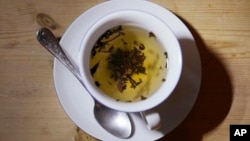The world is full of tea drinkers. For many, they simply enjoy the taste. But new research suggests tea might help those who drink it live longer than those who do not.
Tea is known to contain helpful substances known to reduce inflammation. Past studies in China and Japan, where green tea is popular, have suggested several health benefits. Now, scientists say black tea may show similar benefits.
Scientists from the United States National Cancer Institute carried out the study. They examined years of data gathered about the tea drinking behavior of almost 500,000 adults in Britain for as many as 14 years. Black tea is the most common kind of tea in Britain.
The researchers adjusted for risks that individual may have related to health, living conditions, diet and lifestyle choices, as well as age, race and gender.
The study found that high tea intake — two or more cups a day — was linked to a moderate benefit: a nine to 13 percent lower risk of death from any cause than non-tea drinkers.
The research was published in Annals of Internal Medicine. The scientists say the lowered risk of death held true for study subjects with heart disease. However, researchers said there was no clear finding in connection with deaths from cancer. Researchers were not sure why. But, it is possible there were too few confirmed cancer deaths to measure, said Maki Inoue-Choi, who led the study.
All kinds of tea—green, black, oolong, and white—are produced from the Camellia sinensis plant using different methods.
Tea contains various elements, including polyphenols.
Experts at the U.S. National Institutes of Health say polyphenols are thought to be responsible for the health benefits that have traditionally been linked to tea, especially green tea.
Green tea is reported to improve mental ability, ease digestive problems and head pain, and help people with weight loss. Green tea has also been studied for possible protective effects against heart disease and cancer.
The study of British tea drinkers was based on observing people’s behaviors and health. This kind of methodology cannot prove cause and effect.
“Observational studies like this always raise the question: Is there something else about tea drinkers that makes them healthier?” said Marion Nestle. She is a professor of food studies at New York University.
The study does not offer enough evidence to advise people to change their tea behaviors, said Inoue-Choi.
“If you drink one cup a day already, I think that is good," she said. “And please enjoy your cup of tea.”
I’m Caty Weaver.
The Associated Press reported this story. Caty Weaver adapted it for VOA Learning English.
_________________________________________________________________
Words in This Story
inflammation - n. a bodily response to injury or disease in which heat, redness, and swelling are present
benefit - n. a good or helpful result or effect
adjust - v. to change (something) in a minor way to make it work better
gender - n. the state of being male or female
diet - n. the food and drink that a person or animal usually takes
digestive - adj. relating to or functioning in the body's process of changing food into simpler forms that can be taken up and used
cup - n. a rounded container to drink from
____________________________________________________________________
We want to hear from you. We have a new comment system. Here is how it works:
- Write your comment in the box.
- Under the box, you can see four images for social media accounts. They are for Disqus, Facebook, Twitter and Google.
- Click on one image and a box appears. Enter the login for your social media account. Or you may create one on the Disqus system. It is the blue circle with “D” on it. It is free.
Each time you return to comment on the Learning English site, you can use your account and see your comments and replies to them. Our comment policy is here.











Forum